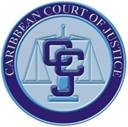International Tribunal Spotlight:
Caribbean Court of Justice (CCJ)
 Introduction
Introduction
The Caribbean Court of Justice is an international court of first instance and an appellate court serving the states and peoples of the Caribbean Community (CARICOM).
The Court (CCJ), which is located in Port of Spain,
Currently, 12 CARICOM members are signatories to the Agreement.
All have common law legal systems heavily influenced by
the British tradition as is the Court itself. Two countries
in the region with civil law traditions,
The Court was inaugurated and heard its first case, a libel
case from
Structure and Composition
The Court is composed of judges sitting in chambers, a Department of Court Administration, and a Registry.
 | |
| Judges of the Caribbean Court of Justice |
There are presently seven judges serving on the Court. Other than the President, who serves for one non-renewable term of seven years, there are no set terms of office for judges. All judges, however, must retire at 72 years of age.
Judges must have at least five years experience as a judge from a court in the region or some part of the Commonwealth with unlimited jurisdiction in civil and criminal matters or not less than fifteen years experience practicing or teaching law.
In contrast to other international or regional tribunals, where judges are typically appointed or elected directly by governments of member states, CCJ judges are appointed by an independent authority established by the Agreement, the Regional Judicial and Legal Services Commission.
 | |
| CCJ judges are appointed by the Regional Judicial and Legal Services Commission |
The Commission’s 11 members, who include the President of the Court as well as jurists nominated by regional law associations and faculties and representatives of civil society, are also responsible for appointing administrative and technical personnel, determining judicial and staff salaries, and exercising disciplinary authority over the judges and other staff.
The Court’s administrative operations, such as judicial research and support, court security, library and information systems, financial affairs, and the Registry are consolidated within the Department of Court Administration, which is managed by the Court Executive Administrator.
Registry functions including acceptance, custody, and preparation of court documents and communications with the parties are managed by the Court’s Registrar & Chief Marshall in partnership with the Court Executive Administrator. Registrars from courts of CCJ member states serve as deputies to the Registrar.
Both the Registrar and the Court Executive Administrator report directly to the President of the Court.
Jurisdiction
|
| |
| Caricom Member States |
The Court exercises dual jurisdiction as a final appellate court for member states and as an international court with original jurisdiction over matters involving the constitutive treaty of the Caribbean Community (CARICOM) and its nine protocols.
In exercising its original jurisdiction, the Court interprets and applies the Revised Treaty of Chaguaramas in resolving disputes among CARICOM members which have accepted the compulsory jurisdiction of the Court. In this role, the Court harmonizes and strengthens the predictability of the legal order of the Caribbean Community.
The Court’s original jurisdiction, which is also exclusive to the Court, extends to matters related to the CARICOM Single Market and Economy (CSME) such as the establishment of economic entities, movement of capital, and the provision of professional services.
In addition to rendering binding judgments, the Court has the authority to prescribe interim measures and issue advisory opinions on the Treaty.
The Court also functions as the highest municipal court, or court of last resort, in the Caribbean when exercising its appellate jurisdiction. It does so by hearing and deciding appeals in both civil and criminal matters from common law courts of states party to the Agreement. This includes, among other matters, those involving the protection of fundamental rights and questions as to the interpretation of Constitutions of states of the region.
To date, only
The Court has promulgated rules of procedure for each type of jurisdiction and has also developed a framework of court performance standards to guide the Court and measure its effectiveness in areas such as access to justice, timeliness, independence and accountability, and public trust and confidence.
Cost/Budget
Recurrent expenses of the Court, including salaries of judges and other staff, are financed from a Trust Fund originally capitalized in the amount of $100 million from contributions provided by the Court’s Contracting Parties.
The Fund, which is administered by an independent Board of Trustees drawn from regional entities, was established to ensure the Court’s long-term sustainability and its institutional independence.
The Court’s revised 2006 Budget totaled $4.412 million.
For More Information
Judgments of the Caribbean Court of Justice
Project on International Courts and Tribunals
Andrew Solomon, ASIL Director of Research and Outreach
Programs
